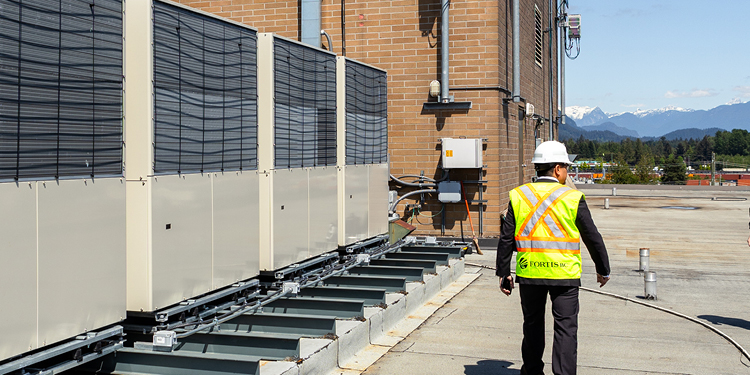How BC ice rinks are cutting costs and emissions with cool technology
December 13, 2019
Canadians know how to put ice to good use: hockey, figure skating, curling. But not all ice is created equal—cracks, bumps and bubbles are not welcome. You need a lot of hot water to resurface ice to keep it hard and smooth, and it takes a lot of energy to heat that water.
An innovative ice-resurfacing technology called REALice is helping arena operators maintain high-quality ice while reducing costs, emissions and energy usage. We were excited about the potential savings for ice rinks in BC, so we began a pilot project to introduce this technology to our customers.
Check out our cool rebates for ice rinks and other commercial operations, or contact an energy solutions manager to see how we can help your operation save money.
What is REALice?
For more than 100 years, ice operators have been using hot water to resurface ice rinks. And as the old saying goes, “if it ain’t broke, don’t fix it,” right? Maybe not. What if there was a more efficient way to achieve the same result, or better?
REALice technology uses a vortex de-arator to remove the macroscopic and microscopic air bubbles in water. The air and treated water go into the ice resurfacer, and then the air is released into the atmosphere.
We asked Florian Gabriel, managing director of SWiCH Services Inc., the Canadian importer of REALice technology, to explain the process further. “REALice changes the properties of the water. It becomes denser and freezes faster, using less energy to freeze and less energy to keep frozen, too,” said Florian. “That’s the basic technology behind REALice rink de-aerators.”
The standard practice of ice resurfacing uses hot water. But with REALice technology, you’re using cold water to resurface ice. That means you’re reducing energy usage, which lowers your greenhouse gas (GHG) emissions and energy costs. Doesn’t get much cooler than that.
Why does FortisBC care about ice rink technology?
We’re working with our customers to create a lower-carbon future for BC. We’ve set one of the most ambitious Canadian utility emissions reduction targets, aiming to reduce our customers’ GHG emissions by 30 per cent overall by 2030.
REALice technology seemed like a great way to help arenas substantially reduce their energy use and emissions, and we wanted to put it to the test. In 2014, we created a pilot program to test the REALice rink deaerators in ten rinks across BC.
The project reduced the arenas’ natural gas use by about 79 per cent, while their electricity savings were reduced by about 28 per cent. As you can imagine, rink managers were pleased.
“They’ve been really impressed with the quality of the ice, as well as the great energy savings,” says Marilyn Christensen, a FortisBC energy solutions manager. “It reduces the draw on the compressors and boilers, it means fewer Zamboni runs, less water use, less water wasted. And the return on investment is less than three years, and it can be as short as two years.”
We’ve got rebates!
Following the massive success of the pilot program, our Conservation and Energy Management team created a rebate program to encourage arenas to make this energy-efficiency upgrade.
“The participation in the rebate program has been amazing,” Marilyn said. “This rebate is a big injection into a small community’s budget. Another thing worth noting is that the technology is actually a very small item to install.”
Nanaimo rink keen to reduce energy use and emissions
Since July 2019, we’ve given out seven rebates up to $20,000 for rink de-aerators to arenas like Beban Park Recreation Centre in Nanaimo. Emil Bock, acting manager of infrastructure planning and energy for the City of Nanaimo worked closely with FortisBC to complete the upgrades.
“The timing was right to upgrade the primary boiler at Beban Park, and FortisBC’s rebate program helped make the project a success,” said Emil. “We knew the REALice technology had been installed successfully in neighbouring municipalities, so we were excited to learn that FortisBC rebates were available to help us implement the technology in our arenas to realize both the energy savings and GHG reductions.”
Chilliwack rinks enjoy improved ice quality, lower costs
Arena operators for the City of Chilliwack were motivated by the prospect of lowering costs while maintaining quality. “Our building is 40 years old, so anything we can do to make it more energy efficient and save money, we’re eager to explore,“ said Mike Knight, arenas supervisor, City of Chilliwack.
“Before installing REALice, we had a sand-based floor for one of our rinks. When making ice using hot water, we were consistently seeing cracks. Since we switched over that hasn’t happened once.” After the easy installation of REALice at two Chilliwack rinks, Mike jumped at the opportunity to have the technology installed on a third rink when the FortisBC rebate became available. “The entire process is really simple, the installation was completed within a day and the rebate was readily available, so it was an easy decision.”
Arena operators are enthusiastic about the quality of the ice made using rink de-aerators. “The water quality does make a difference, and the ice is excellent,” said Mike. “Our costs have decreased significantly, and just last year, our compressors ran for 9,000 less hours, which means we were using way less energy.”
Interested in getting REALice technology for your rink?
Mike suggests that any arena operators who are considering installing a rink de-aerator take a visit to a rink with the product. “They’ll see that the quality is there and the savings are real. Rebates from FortisBC help offset the cost, and as a municipality-owned arena, any savings we see go right back into the community. The process, from completing the installation to receiving the rebate, could not have been simpler.”
Our key account managers help commercial, industrial and business customers determine which equipment is ideal for their needs and who is eligible for rebates. We also have energy solutions managers who are available to help small businesses determine their rebate eligibility, and increase their energy efficiency.
Interested? Let us guide you through the rink de-arator rebate application process.



